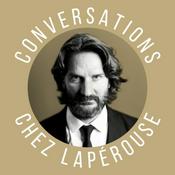1000 épisodes
- The staff writers Emily Witt and Ruby Cramer discuss the situation in Minneapolis, a city effectively under siege by militaristic federal agents. “This is a city where there’s a police force of about six hundred officers [compared] to three thousand federal agents,” Witt points out. Cramer shares her interview with Mayor Jacob Frey, who talks about how Minneapolis was just beginning to recover from the trauma of George Floyd’s murder and its aftermath, and with the police chief Brian O’Hara, who critiques the lack of discipline he sees from immigration-enforcement officers. Witt shares her interviews with two U.S. citizens who were detained after following an ICE vehicle; one describes an interrogation in which he was encouraged to identify protest organizers and undocumented people, in exchange for favors from immigration authorities.
Ruby Cramer’s “The Mayor of an Occupied City” was published on January 23rd. Emily Witt’s “The Battle for Minneapolis” was published on January 25th.
New episodes of The New Yorker Radio Hour drop every Tuesday and Friday. Join host David Remnick as he discusses the latest in politics, news, and current events in conversation with political leaders, newsmakers, innovators, New Yorker staff writers, authors, actors, and musicians. - Last October, Bari Weiss—best-known as a contrarian opinion writer who launched the right-leaning Free Press—was appointed the new editor-in-chief of CBS News. Donald Trump has called her new regime “the greatest thing that’s happened in a long time to a free and open and good press.” The New Yorker staff writer Clare Malone wrote about Weiss’s hostile takeover of CBS for the January 26, 2026, issue of the magazine. In a conversation with David Remnick, Malone discusses her reporting on Weiss: how resigning from the New York Times launched Weiss to prominence as a crusader against what she has characterized as woke groupthink; how Weiss gained the support of Silicon Valley titans who had their own political grievances; and the headlines about Weiss’s rocky beginning as head of a news network, including the on-air travails of her new anchor, Tony Dokoupil.
New episodes of The New Yorker Radio Hour drop every Tuesday and Friday. Join host David Remnick as he discusses the latest in politics, news, and current events in conversation with political leaders, newsmakers, innovators, New Yorker staff writers, authors, actors, and musicians. - Tucker Carlson has long been a standard-bearer for far-right views, such as the racist conspiracy theory known as the “great replacement.” He recently did a chatty interview with the white supremacist Nick Fuentes, an admirer of Hitler. And yet, Carlson started out as a respected, well-connected, albeit contrarian, political journalist. Jason Zengerle, who recently joined The New Yorker as a staff writer, talks with David Remnick about his new book, “Hated by All the Right People: Tucker Carlson and the Unraveling of the Conservative Mind.” They trace how Carlson’s sense of personal resentment toward the establishment grew; how launching his own website radicalized his politics in the years before MAGA; and his political ambitions as a potential heir to Donald Trump. “I think, if Tucker Carlson concludes that J. D. Vance can’t get elected President, maybe he has to do it himself,” Zengerle says. “So much of politics now is just being a media figure and being an entertainer. And Tucker does those things very well. . . . I think our politics are at a place where that really doesn’t seem as outrageous as it would have even just a couple years ago.”
New episodes of The New Yorker Radio Hour drop every Tuesday and Friday. Join host David Remnick as he discusses the latest in politics, news, and current events in conversation with political leaders, newsmakers, innovators, New Yorker staff writers, authors, actors, and musicians. - Danny Funt has been reporting on the gambling boom for The New Yorker, which has generated startling recent headlines, including the arrest of a former N.B.A. coach and the indictment of two M.L.B. pitchers—not to mention the Polymarket user who won four hundred thousand dollars wagering on the seizure of Nicolás Maduro. The legalization of sports gambling, combined with the accessibility of betting apps, has made gambling so pervasive that children in elementary school are routinely placing bets, Funt tells David Remnick. Funt’s new book is “Everybody Loses: The Tumultuous Rise of American Sports Gambling.”
- Before becoming a podcaster, Jennifer Welch had a successful career as an interior designer and co-starred in a reality show on Bravo. But, since 2022, she and Angie Sullivan, her co-host on the podcast “I’ve Had It,” have gained millions of fans as a sounding board for left-leaning political frustrations. These aren’t only concerns about MAGA but also about the Democratic establishment that she views as captive to a corporate agenda. Welch talks with David Remnick about her contentious interviews with Cory Booker and Rahm Emanuel, her belief in “dark woke,” and how a white Oklahoma woman in her fifties emerged as one of the most provocative voices on today’s left.
Plus de podcasts Arts
Podcasts tendance de Arts
À propos de The New Yorker Radio Hour
Profiles, storytelling and insightful conversations, hosted by David Remnick.
Site web du podcastÉcoutez The New Yorker Radio Hour, Nocturne ou d'autres podcasts du monde entier - avec l'app de radio.fr

Obtenez l’app radio.fr gratuite
- Ajout de radios et podcasts en favoris
- Diffusion via Wi-Fi ou Bluetooth
- Carplay & Android Auto compatibles
- Et encore plus de fonctionnalités
Obtenez l’app radio.fr gratuite
- Ajout de radios et podcasts en favoris
- Diffusion via Wi-Fi ou Bluetooth
- Carplay & Android Auto compatibles
- Et encore plus de fonctionnalités


The New Yorker Radio Hour
Scannez le code,
Téléchargez l’app,
Écoutez.
Téléchargez l’app,
Écoutez.




































